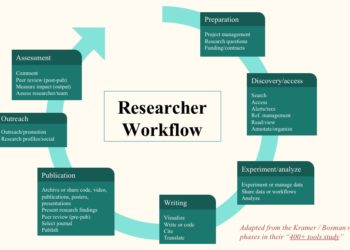Editor’s Note: Today’s post is by Erika Pastrana and Simon Adar. Erika is Editorial Director for the Nature Portfolio and Open Science lead at Springer Nature. Simon is CEO and co-founder of Code Ocean.
The past two years, during the height of the COVID-19 pandemic, have been the most visible example of open science quickly used for the direct benefit of society. Open science practices encompass the sharing of all research objects (code, data, protocols, preprints, etc.) that are produced as part of a research project. Despite clear evidence of the positive societal impact that open science has had, particularly regarding the sharing of research data, there are still barriers and hesitations around the development and adoption of open research practices. Publishers, in partnership with technological platforms, can do their part by providing the right policies backed up by technological support.

Last year, the Research on Research Institute (RoRI) released a report looking at how the scholarly communications system operated during the pandemic, with a particular focus on behaviors around sharing and open research. The RoRI report, rather surprisingly, showed that only 5% of all peer-reviewed COVID-19 studies had an associated preprint and alongside this, the 2021 State of Open Data report showed that only 40% of researchers that participated in the survey engaged in open research practices. Surveys conducted this year, however, have shown a slightly more positive uptick in researcher behavior, with now 4 out of every 5 researchers being in favor of data being made openly available. A recent survey of Springer Nature authors and editors showed that despite 79% being in agreement that making research openly available should be common practice, with nearly 75% of that group indicating that open materials, code, or open data were important for their field – less than 60% (taking out gold OA as an example of open science practice) of that sample were actually adopting open research practices.
Why — despite live examples of seeing the impact of open research practices and the indication from researchers and the academic community that they want open research practices to be the norm — is there such a disparity between awareness, behavior, and action? How can we close this gap so that behaviors align with aspirations around open science?
Putting all these studies together, the reasons presented for the gap are mixed but include concerns around data misuse; lack of credit for sharing data; and the need for better support in how to make data and research sustainably open. Mandates, particularly funder mandates for this particular sample group, seem to have a limited role in driving authors to practice open research (although that may well change with new mandates for data sharing coming into effect from very large funding bodies such as federal agencies in the US). Comparatively, institutional encouragement had relatively good success. Where applicable, journal requirements to share materials, code, or data, or journal encouragement to facilitate preprint deposition, drove the same or greater degree of success as institutional encouragement.
One conclusion that becomes apparent is that more can be done by publishers and their partners to directly help and facilitate the adoption of open research practices. Encouraging or mandating sharing of objects as part of the manuscript publication process is an effective and efficient way of ensuring that open science practices are followed. Journals have been successful in the past in enforcing data-sharing mandates around the release of protein and nucleic acid sequences, for example, so we know that the right policies and initiatives can bring positive change. However, while initiatives to drive policy changes and engaging in collaboration between stakeholders are useful steps, if the above survey conclusions are anything to go by, doing this is not the full picture — what researchers are asking for is direct solutions to support incorporating open research practices as part of their research lifecycle– solutions and support offered directly when they are needed. Publishers should think more creatively about how to move beyond requiring or encouraging and start thinking about facilitating.
Adopting open science practices can be a complex landscape to navigate. One in every 5 researchers is still telling us that they don’t feel they need to adopt any of these open science practices (sharing a preprint, pre-registration, sharing data and code) and those that say that they do want to (49%) are unsure as to how, where, and when. With dedicated processes and platforms for each of the objects, specific requirements to achieve proper registration and metadata for each object, and an end product that does not immediately connect all of these objects into a findable, accessible, interoperable, and reusable ‘research network unit’, the efforts to achieve full open science may seem like an uphill struggle for researchers. On top of this, researchers are having to dig around to better understand policies on what they can share and where and what licensing rights they may have, adding to an already full plate.
Where open research practices are taking place more consistently seems to be where integrated offerings are available to researchers as part of the article submission process.
We have seen this directly through integrated preprinting, data, and code-sharing solutions offered to authors that submit to journals that offer partnerships with platforms such as Figshare and Code Ocean. Taking code as an example, in 2018 Springer Nature partnered with Code Ocean to test the use of containers to facilitate code and data sharing at submission, during peer review, and at publication (for papers where new code was a central part of the work). Those were early days for requiring sharing of research objects, and since then Code Ocean has expanded out working with publishers such as Elsevier, IEEE, and just over 100 other publishers and societies, several of whom are now actively working to integrate compute capsule review into their workflow. In those early days, we felt it was important to offer the right technological solutions to support and help establish the code-sharing policies that we wanted to aspire to as publishers.
In collaboration with the Code Ocean team, we developed workflows and processes that allowed authors to deploy the Code Ocean platform for sharing their code upon submission, and reviewers were able to use this platform to evaluate and review the code. The uptake in the initial stages of this trial was very promising, with 40-60% of authors invited to use the service agreeing to do so. These results further catalyzed our efforts to fully integrate our submission system with the Code Ocean platform: which offered the capacity to gain efficiency and tracking of the process, gather author and reviewer engagement behavior data, and support a more seamless user experience for code and data sharing and peer review. It is still early days to make conclusions about the uptake from authors, but indicators show a very healthy interest, with approximately 40% that report that they have new code, taking up the service offered via Code Ocean in the submissions system.
We have many resources now at our fingertips to help drive forward open research methods and open science practices. But our common aspirations must be followed with real-world contributions to help researchers get to where we all want to be. As partners, publishers, and providers, we now need to move beyond encouragements and policies and focus our efforts on offering support and integrated technical capabilities, so that we can meet researchers with a ready-made solution when they are prepared and eager to share.
Discussion
1 Thought on "Guest Post — Are We Providing What Researchers Need in the Transition to Open Science?"
I love to see partnerships like these to facilitate open science and to ensure that walking the walk is easy for researchers. Thank you both for your leadership. Thank you too for collaborating with CLOCKSS to ensure publications AND underpinning code get preserved and become part of the long-term scholarly record… without any fuss or bother to researchers.



